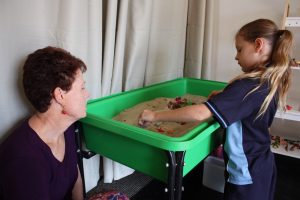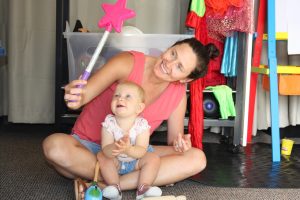Parents often ask the following questions.
How will playing help my child?
 While normal everyday play is imperative for children’s development, this is different to the play that occurs in the Non-Directive play room. If you think of play as a language, as adults we speak differently in differing environments depending of what message we want to get across, where we are and the interactions of others around us. Similarly, in the Non-Directive play room, children are aware of why they are there, and the support of the therapist and so will work on the areas that they identify as the most important to them at that time. The therapist job is to understand the child’s language of play and to link this information to the child’s history and current circumstances. It is important that you let your therapist know if events occur that affect the child or family during their time in therapy. At times the child may use some “normal” play, ften this is as the child warms up or winds down in a session or when they are nearing completion of their sessions.
While normal everyday play is imperative for children’s development, this is different to the play that occurs in the Non-Directive play room. If you think of play as a language, as adults we speak differently in differing environments depending of what message we want to get across, where we are and the interactions of others around us. Similarly, in the Non-Directive play room, children are aware of why they are there, and the support of the therapist and so will work on the areas that they identify as the most important to them at that time. The therapist job is to understand the child’s language of play and to link this information to the child’s history and current circumstances. It is important that you let your therapist know if events occur that affect the child or family during their time in therapy. At times the child may use some “normal” play, ften this is as the child warms up or winds down in a session or when they are nearing completion of their sessions.
How will I know if therapy is helping?
 Before therapy begins you will be asked to identify one or more goals for your child that relate to their current issues. You will be helped to link this goal to a tangible outcome, a behaviour that you would like to see increased. Noting growth in this desirable behaviour is one way that you and the therapist can measure your child’s progress. As well as this, parents often notice other positive behaviours indicating their child’s improved wellbeing. Sometimes with parental permission these changes might be measured on formal scales such as the Child Behaviour Checklist (CBCL). The therapist will touch base with you after 1-2 sessions to give some general feedback and answer any questions. You are encouraged to contact the therapist with any concerns between sessions, rather than at the child’s appointment. This is consistent with the Non-Directive framework, where the therapist will be totally attentive and receptive to your child from their arrival and will make another time for adult conversations.
Before therapy begins you will be asked to identify one or more goals for your child that relate to their current issues. You will be helped to link this goal to a tangible outcome, a behaviour that you would like to see increased. Noting growth in this desirable behaviour is one way that you and the therapist can measure your child’s progress. As well as this, parents often notice other positive behaviours indicating their child’s improved wellbeing. Sometimes with parental permission these changes might be measured on formal scales such as the Child Behaviour Checklist (CBCL). The therapist will touch base with you after 1-2 sessions to give some general feedback and answer any questions. You are encouraged to contact the therapist with any concerns between sessions, rather than at the child’s appointment. This is consistent with the Non-Directive framework, where the therapist will be totally attentive and receptive to your child from their arrival and will make another time for adult conversations.
During the therapy intervention, you will have contact with the therapist in relation to what your child is working on and how you can help at home. After 4 to 6 sessions you will have a formal feedback with the therapist (without your child) and given a written summary of their progress. At this stage, most parents will have noticed changes at home/school that are consistent with what the therapist is seeing in the playroom. The therapy finishes with a another formal feedback and a chance to reflect on your child’s progress.
You won’t see how my child really is as they only act out at school or home.
Having worked with children and families over many years and with a depth of child development knowledge your therapist will understand your child’s behavioural patterns through their history and how they present in therapy. With your permission, the therapist will have contact with your child’s teacher and sometimes observations outside the therapy room are appropriate before your child begins therapy. The therapist understands that children act differently in different environments with different people and will still be able to support your child’s behavioural improvements without witnessing their extreme behaviours.
How long will it take?
While each child is different, most children make good progress in 10 sessions. Under the Better Access to Mental Health Care initiative eligible children can receive a rebate for 10 sessions per calendar year. (There is a gap, see Costs). If a child has had challenges for a long period, they are likely to need more support than a child that has only recently developed an issue. For different reasons, children may only be able to attend for a shorter period. This will be discussed prior to children beginning so that it is understood how many sessions will occur.
Can parents just come and see you?
Yes, sometimes it may be more suitable to have one to a few sessions with parent/parents or carers to offer some support and direction for your family. Often when parents are feeling supported it is easier for them to meet the needs of their children.
Some more information on Parenting Support Sessions is provided under the “Services” tab.